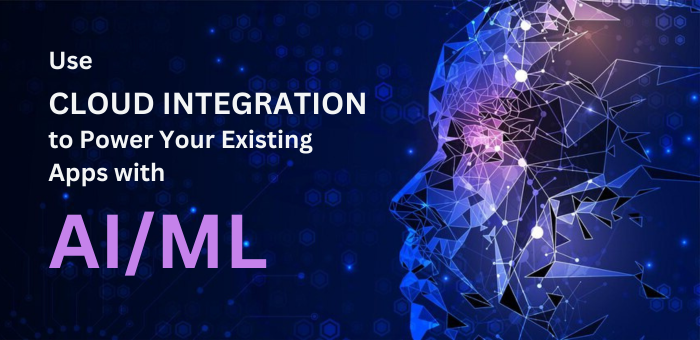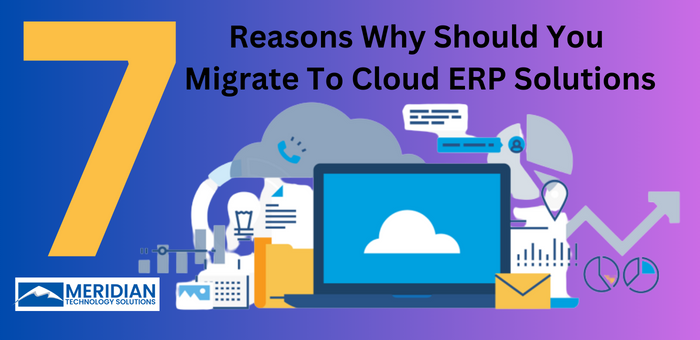Use Cloud Integration to Power your Existing Apps with AI/ML
Artificial Intelligence (AI) and Machine Learning (ML) have reshaped the entire business functioning. These technologies have paved the way businesses operate and provide value to their potential consumers.
The integration of AI and ML technologies into existing applications has become a strategic imperative for businesses across various industries. These technologies enable applications to analyze data, recognize patterns, make predictions, and continuously learn from user interactions. However, implementing AI/ML can be complex and resource-demanding. This is where cloud integration supports the implementation and also, overcomes challenges during the process, if any occur.
AI/ML Integration via the Cloud
Cloud integration is the methodology to connect cloud-based services, platforms, and resources with on-premises or other cloud-based systems. Through cloud integration, businesses can easily access and utilize AI/ML capabilities into your applications.
Let’s explore how cloud integration empowers existing apps with AI/ML, the benefits it offers, and key considerations for successful implementation.
Benefits of AI/ML Integration via Cloud
- Cost-Effective Scalability: One of the primary advantages of cloud integration for AI/ML is scalability. Cloud providers offer on-demand resources, allowing you to scale your AI/ML workloads up or down based on the application’s requirements. This eliminates the need for costly investments in hardware and infrastructure and ensures that your application can handle varying workloads efficiently.
- Access to Pre-Trained Models: Cloud providers often offer a wide range of pre-trained AI/ML models that cover common use cases such as image recognition, natural language processing (NLP), and sentiment analysis. These models are trained on vast datasets and can be readily integrated into your applications, saving you time and effort in model development.
- Rapid Development and Deployment: Cloud platforms provide comprehensive AI/ML development tools and services that streamline the development and deployment of AI-powered features. Developers can access ready-to-use APIs and SDKs, reducing the learning curve and accelerating the integration of AI/ML into existing applications.
- Robust Infrastructure: Cloud providers offer robust and highly available infrastructure, ensuring that your AI/ML models run smoothly and reliably. This eliminates the need for extensive infrastructure management and maintenance, allowing your development team to focus on creating value for your users.
- Data Management and Storage: Effective AI/ML integration requires access to large datasets for training and continuous learning. Cloud platforms offer data storage and management solutions that make it easier to collect, store, and pre-process data, ensuring that your models have access to the information they need to improve over time.
Factors for AI/ML Integration via Cloud
- Data Security and Privacy: When integrating AI/ML via the cloud, it’s crucial to consider data security and privacy. Ensure that sensitive data is adequately protected and that you comply with relevant regulations, such as GDPR or HIPAA. Cloud providers offer tools and services for encryption, access control, and data governance to address these concerns.
- Cloud Vendor Selection: Choosing the right cloud vendor is a critical decision. Evaluate the offerings, pricing models, and capabilities of different cloud providers to determine which aligns best with your application’s AI/ML integration needs. Consider factors such as the availability of AI/ML services, developer tools, and geographic reach.
- Data Integration: Efficient data integration is essential for AI/ML projects. Ensure that your existing application’s data can be seamlessly integrated with cloud-based AI/ML services. This may involve data migration, transformation, and synchronization to enable real-time access to data for AI/ML models.
- Model Training and Evaluation: When using pre-trained models or building custom AI/ML models, it’s vital to have a robust training and evaluation process in place. Cloud platforms offer tools for model training and hyper parameter tuning, making it easier to optimize model performance.
- Monitoring and Maintenance: AI/ML models require continuous monitoring and maintenance to ensure they remain accurate and effective. Cloud providers offer monitoring and debugging tools that help you track model performance, identify issues, and implement updates as needed.
Challenges & Limitations
While AI/ML integration via the cloud offers numerous benefits, it also comes with challenges and limitations that organizations must address:
- Data Quality and Availability: The effectiveness of AI/ML models relies on the quality and availability of data. Organizations may face challenges in collecting, cleaning, and pre-processing data for AI/ML purposes.
- Skills and Expertise: Developing and managing AI/ML models requires specialized skills. Organizations may need to invest in training or hiring data scientists and machine learning engineers.
- Ethical and Bias Concerns: AI/ML models can inadvertently perpetuate biases present in training data. Organizations must implement measures to address bias and ensure ethical AI practices.
- Cost Management: While cloud integration provides scalability, it’s essential to manage costs effectively. Running AI/ML workloads on the cloud can become costly if not properly monitored and optimized.
Use Cases for AI/ML Integration via Cloud
- Personalized Recommendations: Integrating AI/ML via the cloud can enhance user experiences by providing personalized recommendations. E-commerce platforms can recommend products based on user behavior and preferences, while streaming services can suggest content tailored to individual tastes.
- Natural Language Processing (NLP): Cloud-based NLP services enable applications to understand and analyze human language. This is valuable for chatbots, virtual assistants, and sentiment analysis in customer support and social media monitoring.
- Image and Video Analysis: Cloud-based AI/ML services can analyze images and videos, making it possible to automatically tag and categorize visual content. This is useful for content moderation, image recognition, and object detection in applications.
- Predictive Maintenance: Manufacturing and IoT applications can leverage cloud-based AI/ML to predict equipment failures and schedule maintenance proactively. This minimizes downtime and reduces maintenance costs.
- Fraud Detection: Financial institutions can use cloud-integrated AI/ML to detect fraudulent transactions in real-time. By analyzing transaction data and user behavior, these systems can identify suspicious activities and prevent fraud.
Case Study: Netflix
Netflix, the popular streaming service, is a prime example of how cloud integration empowers existing apps with AI/ML. Netflix utilizes cloud services, particularly those offered by AWS, to enhance its user experience and content delivery.
The case of Netflix serves as a demonstration to the transformative power of AI/ML integration via the cloud in delivering personalized and high-quality digital experiences.
- Personalized Recommendations: Netflix’s recommendation engine, powered by AI and ML, suggests content to users based on their viewing history, preferences, and behaviors. This personalization keeps users engaged and encourages longer subscriptions.
- Content Optimization: Netflix uses AI to optimize its content delivery. By analyzing user devices, network conditions, and preferences, it adjusts video quality in real-time, ensuring a smooth streaming experience while reducing bandwidth usage.
- Content Recommendation Algorithms: Netflix employs advanced machine learning algorithms to improve content recommendations continually. These algorithms consider various factors, including user interactions, ratings, and viewing history, to suggest the most relevant content to each user.
- Cost-Effective Scaling: As one of the world’s largest streaming platforms, Netflix relies on AWS for scalable infrastructure. The cloud’s elasticity allows Netflix to handle massive streaming loads, ensuring minimal downtime and a seamless user experience.
Final Takeaway
The bottom line is; cloud integration plays a pivotal role in empowering existing applications with AI/ML capabilities. It offers numerous benefits, including cost-effective scalability, access to pre-trained models, rapid development, robust infrastructure, and efficient data management.
Organizations must carefully consider data security, vendor selection, data integration, model training, monitoring, and maintenance when embarking on AI/ML integration projects. With the right strategy and cloud partner, businesses can enhance user experiences, improve operational efficiency, and unlock new opportunities for innovation and growth.
Are you looking to transform your business with seamless cloud integration services? Hire us for experts and get top-class cloud services today.
Get in touch.


